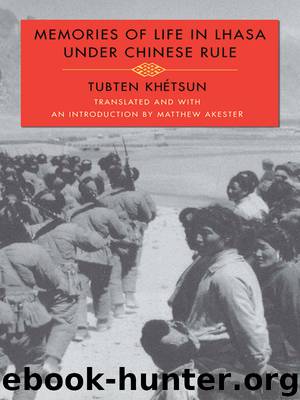Memories of Life in Lhasa Under Chinese Rule by Khétsun Tubten; Akester Matthew;

Author:Khétsun, Tubten; Akester, Matthew;
Language: eng
Format: epub
Tags: HIS003000, History/Asia/General, BIO026000, Biography And Autobiography/Personal Memoirs
Publisher: Columbia University Press
Published: 2007-11-28T16:00:00+00:00
CHAPTER 12
The Agitation by the Muslims of Woba-ling
I WILL JUST say a little bit about the agitation by the Chinese Hui Muslims, which began around 1961 and was coming to an end by the time I got out of prison. In the old days, there were two separate groups within Lhasa’s Muslim community. One was the Muslims of Indian Kashmiri origin, who were businesspeople with shops around the Parkor market street and were referred to by Lhasa people as “Parkor Kha-ché.” The other group lived in an area on the east side of town called Woba-ling, working as butchers, millers, and sometimes market gardeners; their ancestors had come from the Xining region, and they were known to Lhasa people as the “Woba-ling Kha-ché” and in official Chinese usage as the “Hui nationality.” Although both groups practiced the same religion, their places of daily worship and their graveyards were separate, since their forebears had come to Tibet at different times from different places, were of different ethnic origin, and had been granted different areas of settlement by the Tibetan government. Although Buddhists were the majority and Muslims a small minority, both groups were treated without religious discrimination or animosity as equal subjects of the Tibetan government with full access to Tibet’s resources. They had permission to pursue the trades in which they were skilled, and they were economically successful members of the community.
After the devastating events of 1959, which affected everyone in the country, there was no longer any provision for the Parkor Kha-ché to remain in Tibet, and they appealed to the Chinese government to be allowed to return to their country of origin. Permission was granted, and by 1960 or so they had departed for India. The Woba-ling Kha-ché, with their origins in Xining and Gansu, had had very close links with the Guomindang representative office (Don gcod) in Lhasa prior to the Communist invasion due to their racial affinity, and as soon as the Communists arrived in 1950, they welcomed and cooperated with them like a baby embracing its mother. At that time, it was the Chinese-speaking members of the Muslim community, as well as some of the Ba-pas from Kham, who became the most trusted associates and translators of the Chinese, leading to resentment between them and ordinary Tibetans.
When the uprising broke out in 1959, the Woba-ling Kha-ché anticipated trouble and took refuge in the Chinese military camp rather than staying in their homes, and during the subsequent violent suppression, many Muslim youths took up arms and accompanied the Chinese soldiers as translators, oppressing and terrorizing the Tibetans. Because of that, some Tibetans burned down the Woba-ling mosque in the course of the struggle. Once the uprising had been forcibly put down, not only the qualified ones among the Woba-ling Kha-ché but even the old folks who usually stayed home and working members of trading and artisan families went to work as officials with the Chinese during the Democratic Reform campaign. They were rough and hostile with the Tibetans then, and behaved with unlimited arrogance.
Download
This site does not store any files on its server. We only index and link to content provided by other sites. Please contact the content providers to delete copyright contents if any and email us, we'll remove relevant links or contents immediately.
Becoming by Michelle Obama(9760)
The Last Black Unicorn by Tiffany Haddish(5417)
Beartown by Fredrik Backman(5369)
Man's Search for Meaning by Viktor Frankl(4294)
The Book of Joy by Dalai Lama(3702)
In a Sunburned Country by Bill Bryson(3374)
The Five People You Meet in Heaven by Mitch Albom(3337)
Full Circle by Michael Palin(3271)
The Choice by Edith Eva Eger(3216)
The Mamba Mentality by Kobe Bryant(3099)
The Social Psychology of Inequality by Unknown(2770)
Book of Life by Deborah Harkness(2723)
Imagine Me by Tahereh Mafi(2695)
The Checklist Manifesto by Atul Gawande(2661)
Less by Andrew Sean Greer(2575)
A Burst of Light by Audre Lorde(2350)
The Big Twitch by Sean Dooley(2320)
No Room for Small Dreams by Shimon Peres(2240)
No Ashes in the Fire by Darnell L Moore(2212)
